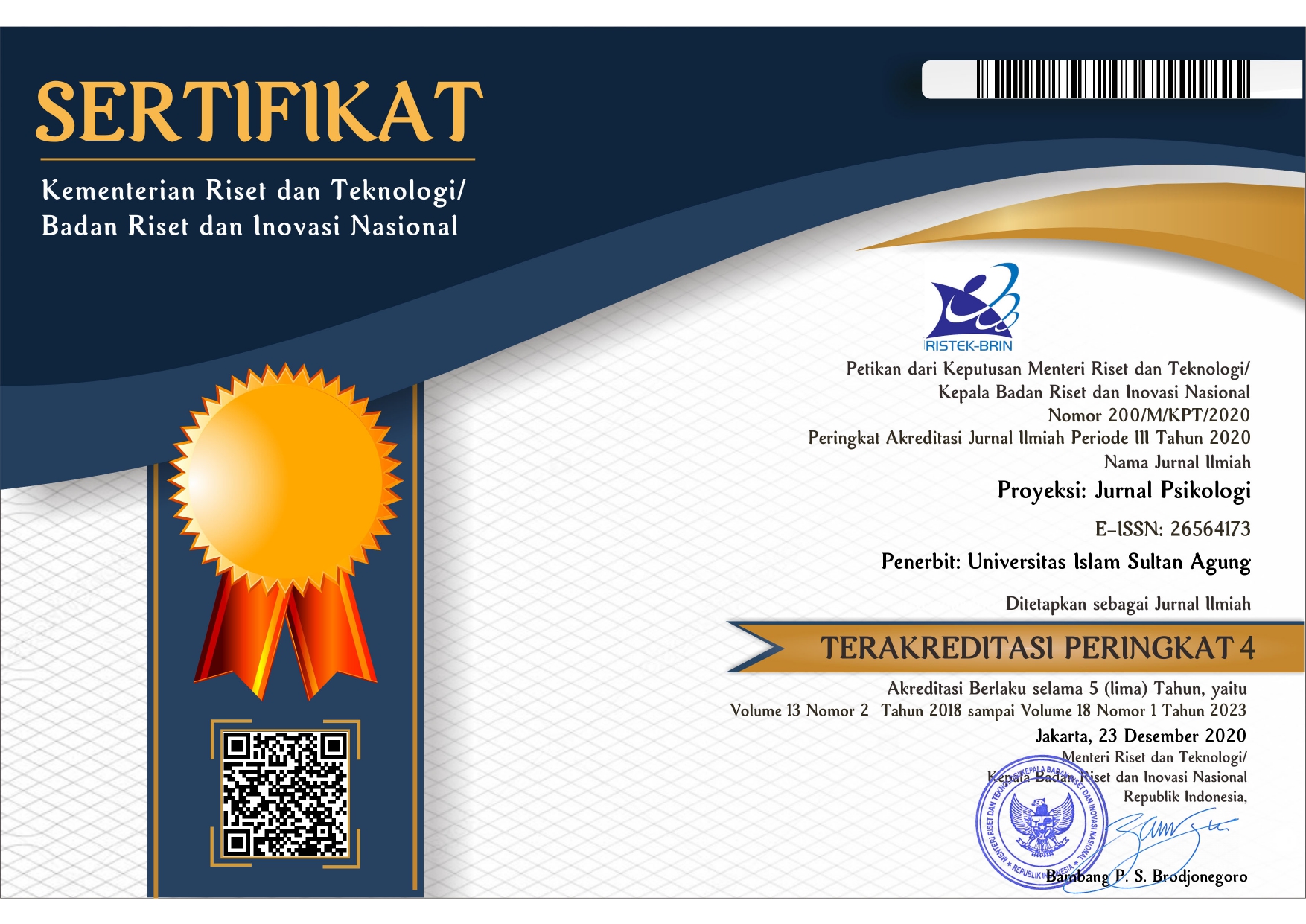GAMBARAN KESEPIAN PADA EMERGING ADULTHOOD
Abstract
Keywords
Full Text:
PDFReferences
Arnett, J. J., Žukauskiene, R., & Sugimura, K. (2014). The new life stage of emerging adulthood at ages 18-29 years: Implications for mental health. In The Lancet Psychiatry. https://doi.org/10.1016/S2215-0366(14)00080-7
Barreto, M., Victor, C., Hammond, C., Eccles, A., Richins, M. T., & Qualter, P. (2020). Loneliness around the world: Age, gender, and cultural differences in loneliness. Personality and Individual Differences. https://doi.org/10.1016/j.paid.2020.110066
de Jong Gierveld, J., & van Tilburg, T. G. (2016). Social Isolation and Loneliness. In Encyclopedia of Mental Health: Second Edition. https://doi.org/10.1016/B978-0-12-397045-9.00118-X
Fadillah, E. Y. (2018). HUBUNGAN KESEPIAN DENGAN DEPRESI YANG DIMODERATORI OLEH RELIGIUSITAS PADA ANAK YATIM PONDOK ANAK YATIM (PAY) AS SALMAN MALANG. PSIKODIMENSIA. https://doi.org/10.24167/psiko.v16i2.981
Farkhaeeni, A. (2011). Pengaruh kecerdasan emosional terhadap konsep diri pada mahasiswa fakultas psikologi UIN Jakarta.
Fiori, K. L., Antonucci, T. C., & Cortina, K. S. (2006). Social network typologies and mental health among older adults. Journals of Gerontology - Series B Psychological Sciences and Social Sciences. https://doi.org/10.1093/geronb/61.1.P25
Hazer, O., & Boylu, A. A. (2010). The examination of the factors affecting the feeling of loneliness of the elderly. Procedia - Social and Behavioral Sciences. https://doi.org/10.1016/j.sbspro.2010.12.450
Patton, M. Q. (2002). Two Decades of Developments in Qualitative Inquiry: A Personal, Experiential Perspective. Qualitative Social Work. https://doi.org/10.1177/1473325002001003636
Permana, M. Z. (2020). PENGEMBANGAN IDENTITAS BARU: KONSEP PERLUASAN DIRI DALAM RELASI INTERPERSONAL. Psikologi Untuk Indonesia: Isu Isu Terkini Relasi Sosial Dari Intrapersonal Hingga Interorganisasi, 43.
Rosedale, M. (2007). Loneliness: An exploration of meaning. Journal of the American Psychiatric Nurses Association. https://doi.org/10.1177/1078390307306617
Russell, D., Cutrona, C. E., Rose, J., & Yurko, K. (1984). Social and emotional loneliness: An examination of Weiss’s typology of loneliness. Journal of Personality and Social Psychology. https://doi.org/10.1037/0022-3514.46.6.1313
Williams, S. E., & Braun, B. (2019). Loneliness and Social Isolation—A Private Problem, A Public Issue. Journal of Family & Consumer Sciences. https://doi.org/10.14307/jfcs111.1.7
DOI: http://dx.doi.org/10.30659/jp.16.2.133-142
Refbacks
- There are currently no refbacks.

Proyeksi by https://jurnal.unissula.ac.id/index.php/proyeksi/ is licensed under a Creative Commons Attribution-ShareAlike 4.0 International License.


